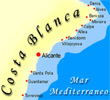READING and USE of ENGLISH
PART FIVE - MULTIPLE CHOICE
![]() You are going to read a magazine article about a radio presenter. Choose the answer (A, B, C or D) which you think fits best
according to the text.
You are going to read a magazine article about a radio presenter. Choose the answer (A, B, C or D) which you think fits best
according to the text.
Mark your answers on the separate answer sheet
• Read the text quickly to get an idea of the topic.
• Read the questions and think about what the answers could be.
• Read the text again more carefully.
• Find the part in the text which has the answer.
• Choose the most logical answer and try to justify your answer with words in the text.
• Eliminate the incorrect answers by using information in the text.
• If you don’t know the answer, guess A, B, C or D. Never leave a question unanswered. A question with no answer is always wrong!
• Often you will have to choose between two posible answers. That’s a guess of 50%. Try to use information in the text to make an intelligent guess.
• You do not have much time, so work quickly.
• In part 5, each correct answer receives two marks.
Note: the following exercise is for practice and has one more question than in the real exam.
|
A Female DJ on the Spanish Coast Shelby Wrightmate talks to Frank Words about what
it's like being a DJ at Costa Blanca Radio. |
||
|
|
Of course, there has been the occasional
disaster. 'For instance, when I did my first live concert show from
Benidorm. The Rolling Stones were playing and I was asked to introduce
them to a crowd of 35,000 and on live TV!.I went on stage and said: "Please
welcome the most famous rock band in the world, their last album ....."
Then I just went blank. There was this silence from the crowd, and for the
life of me I couldn't think of the name of The Stones last album. Someone
shouted the name, ‘Bridges To Babylon’, from the side of the stage. That's
one occasion that I’d like to forget.' |
|
 Use the notes that we have added to help you.
Use the notes that we have added to help you.
| In this part of the exam there are different types of
questions: a) The meaning of a word or phrase (Ex. What does the writer mean by......?) b) What word or phrases a pronoun refers to (Ex. What does ‘it’ refer to in line 45?) The position of the word or phrases could be before or after the pronoun. Read the words around the pronoun carefully. c) Global comprehension (Ex. What is a suitable title for the article? What is the writer’s opinion….?). Before you answer, think about all of the text. This type of question usually comes at the end. Be careful because some of the four posible answers could be correct, but do not correctly answer the question. Other answers could be posible, they may ven have the same words, but they do not correctly answer the question. The questions are always in the same order as the text. The final question could be a global comprehension question about all of the text. When you find the part of the text that corresponds to the question, underline or highlight the information to help you find the answer. |
![]()
| In question 2 above, you have to say what the word
‘there’ refers to. This is very common in part 5. To find what the word refers to, look at the sentences before and after the word. Some other words you might see are:- it, he, she, they, her, them, our, these etc. Some words (do, does, did, it, so, this) can refer to verbs, nouns, adjectives, adverbs, or to phrases and clauses. |
![]() Read the following quotations and find what the highlighted words refer to.
Follow the example.
Read the following quotations and find what the highlighted words refer to.
Follow the example.
Example:
“The young do not know enough to be cautious, and therefore
they attempt the impossible, and
achieve it, generation after generation.”
Pearl S. Buck

![]()
1. “By the time you're eighty years old you’ll have learned everything.
You only have to remember it.”
George Burns
 *When you think you know the answer, click on the menu to check.
*When you think you know the answer, click on the menu to check.
![]()
2. “If you ever reach total enlightenment while drinking beer
it makes the beer shoot out of
your nose.”
Jack Handy

![]()
3. “A woman drove me to drink and I didn't have the decency to thank
her”.
W.C. Fields

![]()
4. “The best executive is the one who has sense enough to choose good men to do
what he wants done, and enough self-discipline not to disturb
them while
they do
it.”
Theodore Roosevelt

![]()
5. “Character may be manifested in the great moments, but
it is made in the
small ones.”
Phillips Brooks

![]()
6. “If you judge people, you have no time to love
them.”
Mother Teresa

![]()
7. “If you want to forget something important immediately, make a note that
this
is to be remembered.”
Edgar Allen Poe

![]()
8. “The best way to remember your wife’s birthday is to forget
it once.”
E. Joseph Cossman

![]()
9. “The only thing you can do with good advice is to pass
it on.
It is never any
use to yourself.”
Oscar Wilde

![]()
10. “Fight for your opinions, but do not believe that
they contain the whole
truth or the only truth.”
Charles A. Dana

![]()
11. “History teaches us that men and nations behave intelligently when
they have
exhausted all other alternatives.”
Abba Eban

![]()
12. “Never accept failure, no matter how often
it visits you. Keep on going.
Never give up. Never.”
Michael Smurfit

![]()
13. I have found the best way to give advice to your children is to find out
what they want and then advise
them to do it.”
Harrry S. Truman

![]()
14. “Any child will tell you that the only purpose of a middle name is so he can
use it when he’s really in trouble.”
Dennis Fakes

![]()
15. “The only way to get rid of a temptation is to give in to
it.”
Oscar Wilde

|
|
TAMBIÉN TE PUEDE INTERESAR:
![]() ¿Quieres recibir en tu e-mail gratis y
periódicamente ejercicios, programas gratuitos, explicaciones y otros recursos
para mantener tu inglés sin esfuerzo? Apúntate a nuestro
cuaderno mensual de inglés.
¿Quieres recibir en tu e-mail gratis y
periódicamente ejercicios, programas gratuitos, explicaciones y otros recursos
para mantener tu inglés sin esfuerzo? Apúntate a nuestro
cuaderno mensual de inglés.
La Mansión del Inglés. https://www.mansioningles.com
© Copyright La Mansión del Inglés C.B. - Todos los Derechos Reservados . -

¿Cómo puedo desactivar el bloqueo de anuncios en La Mansión del Inglés?


 Shelby
Wrightmate is the only female presenter at Costa Blanca
Radio, the only English speaking radio station on the Costa Blanca coast.
She got into music while she was a student in London. She won a
competition at The Hippodrome disco in London’s West End and hasn’t looked
back since. 'I had a 15 minute spot to mix sounds and impress the judges.
I chose some rap fusion, mixed in some other sounds, and I even sang
myself for a bit. I thought I was terrible,' she says, ‘but the judges
gave me first prize and apart from winning £1000, they gave me a regular 2
hour Friday night DJ spot at the Hippodrome. I couldn’t believe my luck.
It was like a dream come true.’ She worked
Shelby
Wrightmate is the only female presenter at Costa Blanca
Radio, the only English speaking radio station on the Costa Blanca coast.
She got into music while she was a student in London. She won a
competition at The Hippodrome disco in London’s West End and hasn’t looked
back since. 'I had a 15 minute spot to mix sounds and impress the judges.
I chose some rap fusion, mixed in some other sounds, and I even sang
myself for a bit. I thought I was terrible,' she says, ‘but the judges
gave me first prize and apart from winning £1000, they gave me a regular 2
hour Friday night DJ spot at the Hippodrome. I couldn’t believe my luck.
It was like a dream come true.’ She worked
 Shelby
is a London girl and coming to the Costa Blanca was like being in London
again. 'I grew up in Romford, Essex which is just outside London,' she
says. 'But I’d always dreamed of living in a sunny country like Spain. My
friends are amazed that I decided to change my life and my country, but
everyone is so friendly here, there are lots of English people living here
and who have kindly offered advice and help. The staff at the radio
station have been fantastic also. Al Koholic , the station manager,
actually lent me one of the station’s lorries to bring my clothes and
furniture over from the UK.'
Shelby
is a London girl and coming to the Costa Blanca was like being in London
again. 'I grew up in Romford, Essex which is just outside London,' she
says. 'But I’d always dreamed of living in a sunny country like Spain. My
friends are amazed that I decided to change my life and my country, but
everyone is so friendly here, there are lots of English people living here
and who have kindly offered advice and help. The staff at the radio
station have been fantastic also. Al Koholic , the station manager,
actually lent me one of the station’s lorries to bring my clothes and
furniture over from the UK.' Shelby
says that her own musical tastes are varied. ‘I’m very lucky at Costa
Blanca because they let me pick my own music for my shows. I select the
tracks in advance and pass them to the station manager for approval. There
isn’t usually a problem because so many listeners write and tell us how
much they like the music I select,' she says. 'But for someone who likes
music, this is a dream job. I get to go to concerts, meet the musicians
and interview the stars that come and play in Spain. It's great to hear
the show business gossip.'
Shelby
says that her own musical tastes are varied. ‘I’m very lucky at Costa
Blanca because they let me pick my own music for my shows. I select the
tracks in advance and pass them to the station manager for approval. There
isn’t usually a problem because so many listeners write and tell us how
much they like the music I select,' she says. 'But for someone who likes
music, this is a dream job. I get to go to concerts, meet the musicians
and interview the stars that come and play in Spain. It's great to hear
the show business gossip.'
